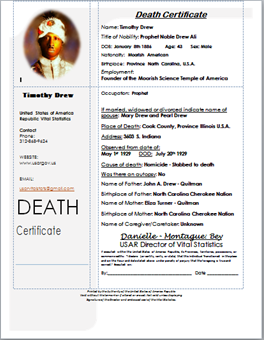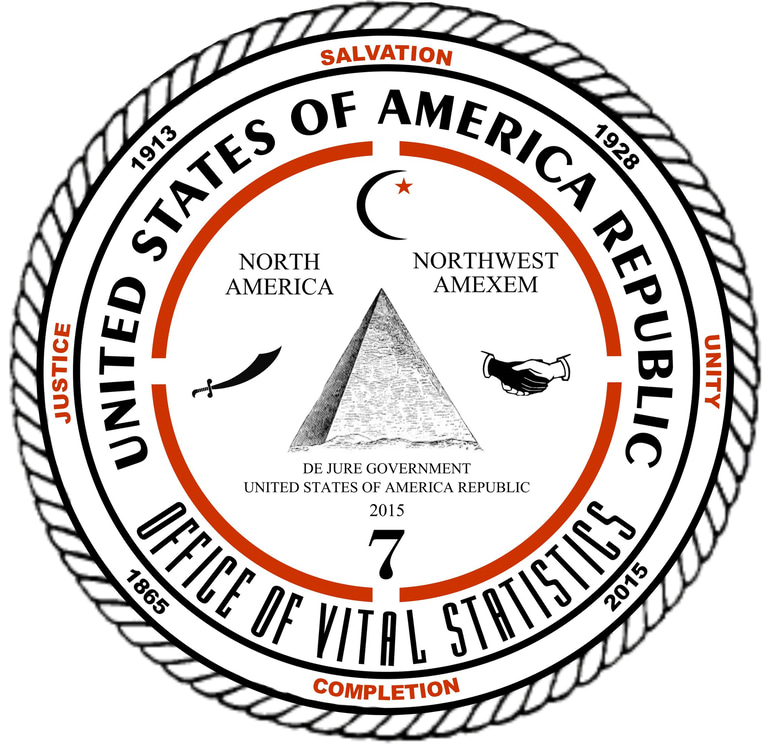an official site of the united states of america republic national gOvernment
Death Certificate
Providing essential records like birth, death, and marriage certificates.


Death Certificates
Legal documents confirming the passing of individuals.
The Importance of a Death Certificate
A death certificate is an official document issued by a government authority that records the death of an individual. It serves as both a legal record and an important tool for managing the affairs of the deceased. This document is typically issued by a physician or a coroner, and it includes key details such as the cause, date, time, and place of death. While the death certificate may seem like a simple formality, it holds significant importance in various legal, financial, and personal contexts.
Here are the key reasons why a death certificate is important:
1. Legal Recognition of Death
A death certificate provides official legal recognition that a person has passed away. It is necessary for declaring an individual's death legally, and without it, certain processes—such as the administration of estates or the settlement of a person's affairs—cannot begin. It serves as proof that the individual is deceased, which is essential for legal matters.
2. Initiating the Probate Process
When a person passes away, their estate typically goes through a legal process called probate, which involves the administration and distribution of the deceased's assets. A death certificate is a critical document in initiating this process. It is required by courts and financial institutions to prove the death and allow the distribution of assets according to the decedent's will or, if there is no will, according to state laws.
3. Settling the Deceased's Financial Affairs
A death certificate is needed to close the financial accounts of the deceased, including bank accounts, credit cards, loans, and mortgages. It is also used to cancel subscriptions, insurance policies, and memberships. The document is crucial for notifying institutions that the person is deceased and preventing any further charges or misuse of the individual’s accounts.
4. Access to Life Insurance Benefits
Life insurance companies require a death certificate to process and pay out life insurance claims to the deceased's beneficiaries. Without a death certificate, beneficiaries would not be able to access the insurance benefits that are owed to them. This certificate serves as the official document proving that the policyholder has passed away, which triggers the payout.
5. Inheritance and Estate Claims
A death certificate is necessary for family members and heirs to claim inheritance from the deceased’s estate. Whether the estate is being passed down through a will or through the laws of intestacy (if there is no will), the death certificate must be presented to prove that the person has died. It is a key document in ensuring that assets are transferred legally and in accordance with the deceased's wishes.
6. Social Security and Government Benefits
For individuals receiving social security or government benefits, a death certificate is required to stop any payments and ensure that the appropriate benefits are passed on to surviving family members. The death certificate is often needed to terminate programs like Social Security Disability, pension plans, or survivor benefits.
7. Genealogical and Historical Research
A death certificate is a valuable tool for genealogists and historians tracing family lineages and documenting the lives of individuals. The information on a death certificate can provide key details about a person's life, such as their birthplace, occupation, and cause of death, contributing to the preservation of family histories or societal records.
8. Settling Health Care and Medical Affairs
In certain cases, a death certificate may be required to settle health care accounts or medical bills. If the deceased was undergoing treatment at the time of death, the certificate serves to finalize medical records and resolve any outstanding financial obligations. Additionally, it may be required to notify health insurance companies about the death and to terminate policies accordingly.
9. Preventing Identity Theft
A death certificate is a protective measure against identity theft. Once a person dies, their identity can be vulnerable to fraud if not properly documented. The death certificate ensures that the person’s death is officially recorded in government databases, preventing the misuse of their identity, such as opening new accounts or committing fraud under their name.
10. Funeral Arrangements and Burial
A death certificate is necessary for funeral homes to proceed with arrangements and to authorize the burial or cremation of the deceased. It is also required by cemeteries for the formal interment process. Additionally, the certificate serves as proof for the family to access cemetery plots or memorial services.
11. Tax Filings and Final Returns
A death certificate is required for the filing of the deceased’s final tax returns. The executor of the estate needs the document to file the final income tax return for the individual and to settle any tax liabilities. The certificate also helps in determining whether estate taxes are due and can be used in claims for tax exemptions, such as those related to inheritance.
12. Healthcare and Organ Donation Records
In some cases, a death certificate is necessary for finalizing medical or organ donation records. For individuals who donated organs or tissues upon death, the certificate is used to close the donor registry and ensure that records are properly maintained.
13. Marriage or Divorce Records
In the case of widows or widowers, a death certificate is required to update marital status on legal records. If a spouse passes away, the surviving spouse may need to present the death certificate in order to remarry or to resolve marital obligations from a previous marriage.


United States of America Republic
ADDRESS: USAR VITAL STATISTICS
© 2025. All rights reserved.
Department of Vital Statistics
1499 MLK DR, STE 64102
PROVINCE INDIANA, 46402
